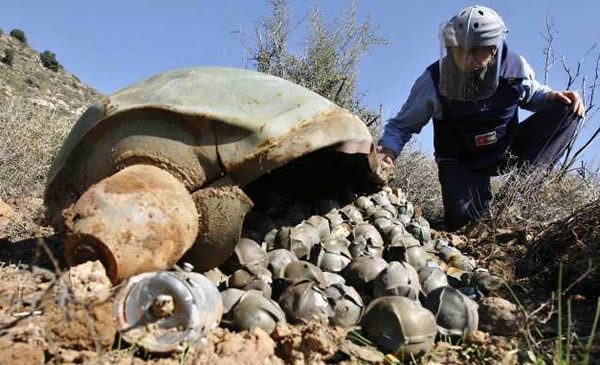Yesterday, the Australian Senate Standing Committee on Foreign Affairs, Defence and Trade was due to deliver its report on its inquiry into the Criminal Code Amendment (Cluster Munitions Prohibition) Bill 2010. This is the proposed legislation that will enact Australia’s obligations under the Cluster Munitions Convention, which it signed at the end of 2008.
However, the report still hasn’t been made. Delays caused by other deliberations running overtime have meant that the report may be tabled out of session late this afternoon or over the weekend. With Parliament due to adjourn for 7 weeks at the end of this week, it’s unclear what the opportunities there will be to debate the report and legislation. Regardless, it’s likely to be controversial and already we’re seeing opinion pieces in the news saying that the proposed legislation doesn’t go far enough, or that any attempts to make the legislation more prohibitive could put Australian troops at risk.
The draft legislation itself is quite controversial. In particular, it includes three provisions which have come under fire from disarmament advocates and NGOs;
1. Language that indirectly permits Australian troops to participate in the planning of joint military actions that use cluster munitions, or allows Australians to call in cluster munitions strikes where the choice of weapons is not in their ‘exclusive control’
2. Language that allows the cluster munitions of non-states parties to transit through Australian territory
3. Language that allows non-states parties keep their foreign stockpiles of cluster munitions on Australian territory, such as a foreign military base.
Why is this controversial? Mainly, it’s because one of Australia’s main military allies (and one we are involved in joint military operations with), the United States, is not a state party to the Cluster Munitions convention. Whilst it has scaled back use since 2008, the US has used cluster munitions in both Iraq and Afghanistan, and has fallen short of an outright ban. Therefore, the chances of Australian troops coming into contact with military allies retaining or using cluster munitions remains quite high.
I just came across this article by Thom Woodroofe which argues strongly that the above provisions in the draft legislation are essential in order to protect Australian troops from prosecution for simply carrying out their duties. Whilst it is true that Article 21 (3) of the Cluster Munitions Convention allows for states-parties to participate in joint military operations with nations that have not joined the convention, the restrictions on using or assisting in the use of clusters, including planning attacks, still apply. Moreover, Woodroofe’s argument fails to recognise that Article 21(3) needs to be considered within the broader object and purpose of the Convention – namely, to end the use of cluster munitions as a weapon of war across the globe. The Preamble of the Convention emphasises ‘the desirability of attracting the adherence of all States to this Convention, and determined to work strenuously towards the promotion of its universalisation and its full implementation’. What’s more, the Convention includes obligations on states parties to actively promote the norms of the Convention and to encourage other states to join, with the end goal of universal adherence.
What message are we sending to the US and other allies that have not signed the Convention, by actively protecting their right to use Australian territory to transport or store their cluster munitions? What message are we sending when we don’t explicitly prohibit Australian troops from assisting other states, by planning attacks or creating rules of engagement, to use cluster munitions? In essence, Australia is making it easier for such countries to continue to use cluster munitions, and is giving them an excuse to continue ignoring the Convention forever. Rather, we should be encouraging the US and others to join the treaty, which means putting pressure on them as appropriate by sending a clear message that the use of cluster munitions is not acceptable.
If we truly want to end the use of these horrible weapons, we should enact legislation that truly reflects the object, purpose and spirit of the convention. Australia has a legitimate right to include the provisions of Article 21(3) so our troops can continue to engage with our military allies. Yet our own domestic legislation should not include protections for those who continue to use clusters that go further than the provisions of the Convention. Therefore it is critical that the current draft legislation is amended in the interests of promoting the Convention to those countries that are yet to join. When the Senate Committee delivers their report this afternoon, I hope that Australia is able to set the right example.
The Senate Standing Committee Foreign Affairs, Defence and Trade is due to submit its report on the Criminal Code Amendment (Cluster Munitions Prohibition) Bill 2010 this afternoon, Friday 25th March 2011. You can find more information about the inquiry here



